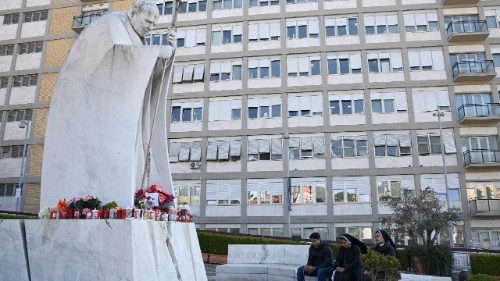Saint Thomas More: acting in conscience
A testimony of fidelity and strength in times of persecution

The figure of Saint Thomas More (1470-1535) is captivating. Humanist, jurist, politician. Chancellor of the Kingdom of England from 1529 to 1532, “faithful and true subject of the King”, a staunch Catholic. He paid with his life what he could not in conscience admit in the turbulent times he lived through during the reign of Henry VIII. I have read his Last Letters (1532-1535) (Acantilado, 2010). Particularly significant are those he wrote from the Tower of London, where he was imprisoned from April 17, 1534, to July 6, 1535, the day he was beheaded, after his conviction for high treason.
At the behest of Henry VIII, Parliament passed the Act of Succession, declaring the validity of his marriage to Anne Boleyn and the nullity of his marriage to Catherine of Aragon. Shortly afterward, the Act of Supremacy was passed, establishing the king as the visible head of the Anglican Church, separating himself from Rome and the Pope. Thomas More refused to take an oath to the content of these Acts: in good conscience, after having studied it a great deal and having consulted on the matter, he could not take such an oath. Thus, he wrote to Margaret: “My child, more than two or three times we have talked together on this matter (…), and twice I have also answered you that if in this matter it were possible for me to do what would make the king happy, and God would not be offended by it, no man would have taken this oath with more joy than I: as one who sees himself more deeply obliged than all others to your majesty for your very singular generosity, shown and declared in so many ways. But as my conscience interferes, I cannot do so by any means. For the instruction of my conscience on this subject, I have not glanced lightly at it, but have for many years studied and consulted it, and yet I have never been able to see or hear, nor do I think I ever shall be able to, that which would induce my own mind to think otherwise” (p. 105).
Thomas More was a loyal and grateful subject to the English crown. He kept silent about the reasons why he would not take the oath that was required of him: he did not discuss them with any of his people or with strangers, and he was careful not to induce others to follow him in his way of seeing things. He knew the danger that could be brought to those who refused to swear the acts, and he did not want to expose other subjects to such evils with his ideas. His nobility of spirit led him not to criticize the conduct of those who swore the acts.
In good conscience, Moro could not take that oath, because he considered that these were not simple acts of a political nature – with which one could agree or not, as in any political matter – but rather they were acts that offended God and his message on essential issues: the nature of marriage and the apostolic of the Universal Church. Matters that Moro understood were not the responsibility of political power and on whose meaning he should not demand obligatory consent from his subjects.
In our century, conscientious objection empowers citizens to refuse to perform acts that violate their conscience. Acting in good conscience is not a whim or a mere scruple, the latter being a reproach that some made to Moro. He writes to his daughter: “And although I know very well my own fragility and the faint nature of my heart, if I had not trusted that God would give me strength to bear anything rather than offend Him by sacrilegiously swearing against my own conscience, you can be sure that I would not have come here. And since in this matter I look only to God, I care little if people call it what they please and say that it is not conscience, but a foolish scruple” (p. 106). Neither whim nor scruple, what is at stake within personal conscience is the truth of personal biography.
Acting in conscience, being faithful to it, requires a lot of strength – borrowed strength from the Christian, by the way: because You are, Lord, my strength. Moro knew it: loss of his property, his honor and his life. Moro’s case is painful, and it remains painful and difficult to remain faithful to conscience in our time. Sometimes, conscience demands silence, other times, it demands public expression. Social pressure, the force of political or economic power, media pressure groups, so often try to monopolize thought or establish lifestyles with which one does not agree. This self-censorship is a bad thing and, even worse, the attempt to silence freedom of thought with intemperate acts of cancellation.
Moro was accused of having acted “maliciously” by denigrating the good reputation of the King and his family. A conduct alien to Moro, who at all times behaved like “a faithful and true subject of the King – he writes in one of his letters – and I pray daily for him and for all his people and for his entire kingdom. I do nothing bad to anyone, I say nothing bad about anyone, I think nothing bad about anyone, but I wish good for everyone. And if this is not enough to keep a man alive, the truth is, I do not wish to live any longer” (Cit. in Hernán Corral. El proceso contra Tomás Moro. Rialp, 2015). A beautiful and profound synthesis of what is a good life and freedom of expression: expressing one’s thoughts without defaming or injuring people or institutions.
Having a conscience, forming a conscience, acting in conscience continues to be one of the most delicate dimensions of the human being. It cannot be seen, but it is there, inside the soul, and it speaks to us.
Related

Pope Francis spent a peaceful night
Exaudi Staff
02 March, 2025
1 min

Pope Francis has had a peaceful night
Exaudi Staff
25 February, 2025
1 min

What should the boyfriend or girlfriend I should find be like?
Patricia Jiménez Ramírez
24 February, 2025
4 min

The Pope spent a quiet night at Gemelli
Exaudi Staff
23 February, 2025
1 min
 (EN)
(EN)
 (ES)
(ES)
 (IT)
(IT)

